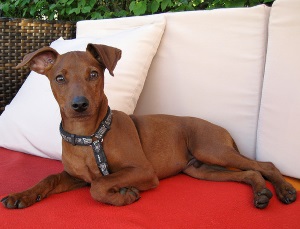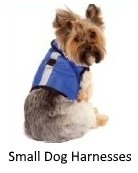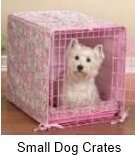Miniature Pinscher Dog Breed
The Miniature Pinscher dog breed is believed to be an ancient one as
evidenced by the discovery of their likeness in old paintings and
sculptural artifacts.
That being said, their true origins are debatable due to the lack of recorded information until around the 1800's.
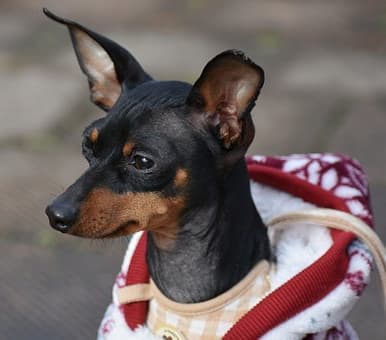
But what we do know is that the Miniature Pinscher dog breed originated
in Germany and is believed to be descended from the German smooth-coated
Pinscher, Italian Greyhound, the Klein Pinscher from Scandinavia and
the smooth-coated Dachshund.
In Germany they go by the name Zwergpinscher - zwerg loosely means midget and pinscher refers to a dog's hunting technique.
Min Pins, as they are nicknamed, have frequently been compared in
appearance to a miniature version of the Doberman Pinscher. Some people
also presume that they are actually related to the Dobie which is not
the case, the Doberman being a separate breed entirely.
Because of their deer-like features, they also picked up the name of Reh
Pinscher, Reh referring to the very small Roe deer that once roamed the
forests in Germany.
Fanciers of the Min Pin like to think him as the King of Toys.
In their early days this breed was primarily used as a working dog and
had the unglamorous, but essential job, of eradicating rats and other vermin from farm households and
stables.
Breeds that are similar in appearance to this breed include the Toy Fox Terrier, the Rat Terrier and the Manchester Terrier.
Ten years after the Miniature Pinscher dog breed first arrived in the United States, a national club was formed
to represent them and the breed was shown in the "Terrier" group. In fact Pinscher is the German word for terrier.
However, later on the breed was reclassified into the AKC toy dog breeds, where they remain today. The breed was recognized by American Kennel Club in 1925.
Miniature Pinscher dogs are compact, yet leggy, little dogs with a
seriously confident, cheerful demeanor and fearless nature. While they
may be expected to live up to as much as 17 years, one has been recorded
in the Guinness Book at the grand age of 21!
The Min Pins are very popular pets and make excellent companions. They also enjoy success as a show dog.
Appearance and Grooming
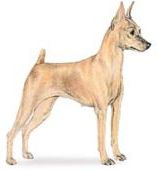
Clean cut and sleek are the words that come to mind in describing the Miniature Pinscher dog breed. He has a very well-balanced look and a natural show dog stance. His expression is
made ever alert-looking by his erect ears and attentive eyes.
The Min Pins do live up to the miniature part of their name standing at a
height of 10-12-1/2 inches and a weight between 8 to 10 pounds
Coat colors per the official standard include the following: black/tan combo, chocolate/tan combo and stag red.
The coat is sleek and smooth and sheds little. Grooming is easily handled by wiping down with a dog cloth and
brushing about once or twice a week.
Helpful grooming tools are the ZoomGroom or a glove brush along with a boar bristle brush for finishing.
This breed is sensitive to the cold, so dog coats or sweaters are a good idea on cooler days.
Temperament And Traits
The Miniature Pinscher dog breed is fearless, intelligent, and learns quickly. They have a good reputation as watchdogs, but they can easily become barkers. For this reason, it is wise to train them to be quiet at your command and understand that not every sound is a threat or an intruder!
The Min Pin is not your typical toy dog that is waiting to be pampered - they are feisty and confident and will rule the roost if you don't establish your leadership from the get-go. You should also keep a close eye on them as they tend to scour every nook and cranny in their domain and often in ways that are undesirable.
On the other hand, they are a very loving and devoted breed with a lively spirit, and make excellent, as well as entertaining, pets. The Min Pins also are ideal show dogs being natural performers that enjoy being the center of attention.
Miniature Pinscher Dog Breed Health
The Miniature Pinscher is generally known to have good health, but there are some hereditary conditions that may affect him.
These are the main health issues to be aware of:
- Progressive Retinal Atrophy (PRA): An inherited condition that gradually leads to vision loss. This disease affects the retina, leading to degeneration of the retinal cells, ultimately resulting in blindness.
- Patella Luxation aka Slipping Kneecap: As the name implies, this involves a dislocation of the kneecap to varying degrees and is usually an inherited defect and more common in toy or smaller breeds. Responsible breeders will screen more than one generation of parents for this condition, before breeding, as well as the resulting puppies.
- Hypothyroidism: A disease resulting from thyroid hormone deficiency. Typical signs include weight gain, absence of heat cycles, hair loss and lethargy. It is generally treated with replacement hormones.
- Epilepsy: A neurological disease caused by abnormal electrical activity in the brain resulting in seizures or convulsions. Often there is no known cause.
- Legg-Calve-Perthes: A disease of the hip joint that results in necrosis of the femoral head caused by a lack of blood supply.
Eye problems and heart defects have also been noted. More health information is available at the Miniature Pinscher Club of America.
Responsible breeders will incorporate the AKC standards (or similar) in their breeding program. When you are acquiring a puppy, make sure to ask the breeder for the medical records of the parents as well as tests that have been completed prior to breeding.
With the benefit of good care, high quality nutrition, sufficient exercise and regular check-ups by a veterinarian, pet parents can expect to enjoy their Min Pin for up to 17 years.
Activity Level of the Min Pin
If you're not in good shape, this may not be the dog for you! The Miniature Pinscher dog breed is a veritable bundle of energy and fast on their paws too! I kid you
not.
It goes without saying that they enjoy - and should be given plenty of
exercise in spite of the fact they have probably worn you out with
their high jinks around the house.
A large area where they can run freely is just the ticket for you and the dog, in addition to a substantial regular walk.
Do make sure your property boundaries and gates are secure as the Min
Pin will be "outta there" if he finds a vulnerable spot to escape. Let's
not forget that he has springs in his legs when it comes to jumping
too!
Ideal Living Space
Bearing in mind the activity level recommendations noted above, the Min
Pin is not fussy about space and will adapt easily to either house or
apartment. Heck, he doesn't take up much room!
But if you live in the latter, it will work
out much better for you and your neighbors if your dog has learned the "quiet" command.
The Min Pin With Children?
Is the Min Pin good with children? Well Yes and No. The fact is, Miniature Pinschers can be a handful
and are not at ease around young children. They can be snappy if
pestered, poked or teased.
More mature children over the age of 11 would be a better fit especially if the family has previously had a dog.
Aside from that, one thing's for sure, if you do have children, make sure an adult supervises their activities with pets.
Companion For Seniors?
The Miniature Pinscher is a very protective breed that can make a
devoted companion to any dog lover. That's the good news! But, you know
there's a but coming...
...he won't do well in a sedentary household without a place where he
can run freely and where someone is available to take him out for daily
exercise.
If you happen to be active seniors with a sense of humor who enjoy
high-energy pets, you'll find the Miniature Pinscher dog breed right up
your alley!
Find A Min Pin to Buy Or Rescue
The first step in finding Miniature Pinchers is locating a reputable breeder because professional breeders are concerned with the quality and health of their puppies.
On the other hand, casual breeders, along with pet shops and puppy mills, should be avoided because they are not concerned with upholding any standard - only about the breed's popularity and making sales.
Here are some places to begin your search: The American Kennel Club maintains a list of breeders pledged to uphold AKC-endorsed responsible breeding practices: https://www.marketplace.akc.org/
- Available puppies can also be found through the AKC Marketplace
- Miniature Pinscher Club of America for breeder referrals
- Miniature Pinscher Club of America for Rescue contacts by state
Local Minscher Pinscher breed clubs and sometimes local animal shelters are other sources to check for rescues and adoptable dogs. Attending local dog shows and connecting with breeders is another way to meet the breed.
The cost to purchase an Miniature Pinscher puppy is between $1,000 to $2,000. The reputation of the breeder, lineage, coat color, and health testing can have an affect on the price.
Other expenses to calculate include: required dog license, vaccinations, insurance, everyday maintenance costs, which include routine vet visits, food, training, crate, toys, grooming tools and supplies etc.
Health insurance premiums are less if you purchase your Min Pin as a puppy, before any health issues have occurred. This is a cost effective approach over the lifetime of your pup to cover the rising cost of veterinary care and unexpected needs.
Do your research before meeting a breeder so you know what to ask. You can tell a lot about a reliable breeder by how willingly the parents health history are provided and if they encourage you to meet the parents.
Before You Go...
If you like the content of this page, as well as others on my site, please give it some love by clicking on the heart in the lower right hand corner. This helps me keep providing enjoyable and useful content.
Thank you.
Recommended Reading
Charlotte Schwartz trainer and behaviorist, shares her insights about all aspects of caring for a Miniature Pinscher. After reading this guide, you'll know what to expect from this little dog and how to solve the most common everyday problems associated with the breed.
